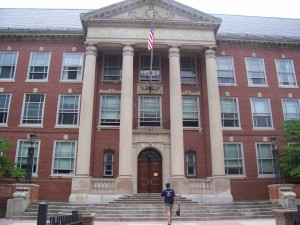submitted by jwithrow.
Journal of a Wayward Philosopher
Crafting a World-Class Education
January 9, 2015
Hot Springs, VA
The S&P opened at $2,063 today. Gold is up to $1,214 per ounce. Oil is still just under $49 per barrel. Bitcoin is flat at 287 per BTC, and the 10-year Treasury rate opened at 2.00% once again today.
Keep an eye on the oil patch – that’s where the interesting action will be as we move into 2015. Losses will start to crop up if the price of oil remains flat for any extended period of time. Most of the U.S. shale boom has been financed by debt, not equity. We can expect some of these losses to show up in the bond market as repayment becomes difficult at current prices.
But it won’t be quite that simple. Financing oil exploration also involves swap contracts and derivatives which are then packaged, moved, and sold. This means that some losses may not be borne by the oil companies but rather move over to the bank. But the banks are just middlemen so many of the swap contracts very well may have been sold to institutional investors such as exchange-traded funds. No one knows exactly where the risks are so discovering where the losses pop up if oil remains flat will be much like playing whack-a-mole.
Yesterday we discussed why the public school system fails and we decided the best thing for a concerned parent to do is opt out.
But then what? Most of us have gone through the public school system so we are accustomed to the rigid top-down model of education.
Do we look to private schools? Some of them probably offer a service that is superior to the public school system but they are still based on the authoritarian “gymnasium” model and they probably use the same politically-correct textbooks. And they are expensive! As mentioned yesterday, the Sudbury Valley Schools are an exception as they do not employ the “gymnasium” model. If you live close to one of these schools then that may be a great option.
For the rest of us, we are on the frontier – it’s up to us to craft a world-class homeschool program. To do so we must first understand what education is. The word educate stems from the Latin word ‘educo’ which means “to bring up; to draw out”. You see, education is not about teaching; it is about learning. There is only learning. We’ve had it backwards for quite some time now.
An individual’s education actually begins the moment they are born; and maybe even the moment they are conceived. At birth, infants are completely helpless. Within twelve months’ time they have learned to follow objects with their eyes, move their appendages, hold their head up, coo and chuckle, roll from side to side, grasp objects in their hands, laugh, sit up, play with multiple objects, crawl, stand, and maybe even say a few words.
Within twenty four months’ time that same infant has learned to walk and play, climb stairs, color with crayons, use gestures, and use several words together intelligibly.
Within sixty months’ time the infant has learned how to move freely throughout the house, use sentences with nouns, verbs, and modifiers, recognize colors, recognize his or her own name, age, and gender, play with other children, communicate with adults, write his or her name, and to feed him or herself.
That is an amazing amount of development within a short period time! And guess what? There is no system in place mandating or forcing the infant to absorb any of this. The infant learns all of these essential items on his or her own with the guidance of parents and trusted adults.
In crafting a homeschool program it is important to allow this natural education to continue uninhibited. The curriculum chosen should supplement this natural education; it should not take the place of it.
The development of technology has, for the first time in history, made access to quality supplemental curriculum free to everyone with a computer and an internet connection. One can go online and read essays or view lectures on any subject imaginable. There are millions of articles and countless books available to read online at no cost to you. The Ludwig von Mises Institute’s web site offers the entire manuscript of many great books in the fields of Austrian Economics and the philosophy of Liberty absolutely free. The Ron Paul Curriculum offers K-12 curriculum completely online including a platform for students to interact with each other.
This type of technology is unprecedented in human history! Technology is not only liberating education from the confines of centralized authority, but it is doing so at a greatly reduced cost. It is completely possible for enterprising parents to supplement their child’s natural education with a world-class curriculum for pennies compared to what the public school system costs.
If you venture down this path be sure to familiarize yourself with the Homeschool Legal Defense Association as well as your state’s laws regarding homeschooling. And always keep the big picture in mind.
Education is not about indoctrinating children to think the same things we think. It’s not about taking up all of a child’s free time to keep him out of trouble. It’s not about “beating” other countries on standardized tests. It’s not about setting a child up to get into the best college or to secure a high-powered desk job.
Education is individual in nature. Children, free to discover and pursue their own passions, will learn so much more on their own than they ever could in a classroom. And they will grow into self-governing and self-driven adults capable of thriving in an ever-changing world.
More to come,
Joe Withrow
Wayward Philosopher
For more of Joe’s thoughts on homeschooling and educational alternatives please read “The Individual is Rising” which is available at http://www.theindividualisrising.com/. The book is also available on Amazon in both paperback and Kindle editions.



